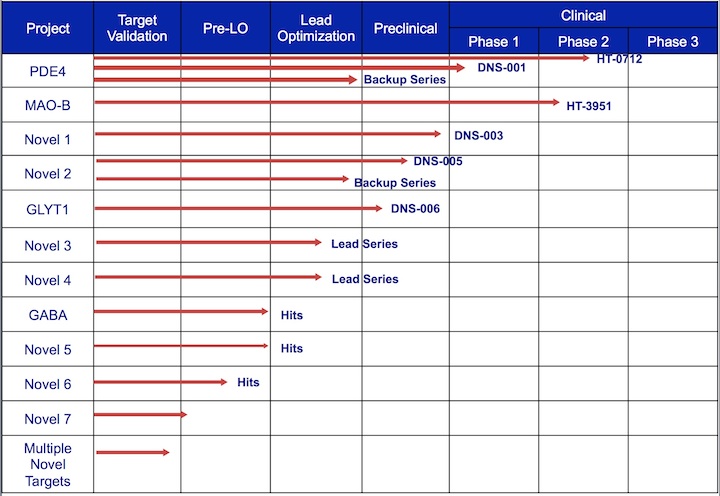DART PHARMA ®

Drug Development Programs
DNS has identified protein targets for drug discovery in two complementary ways. The first approach was to develop a high-throughput cell-based assay to screen for compounds that modulated a CRE-luciferse reporter gene in human neuroblastoma cell lines. From a 180,000 compound library, hundreds of confirmed hits were found and 10 with novel structures were selected for further study. Biochemical analyses revealed that 8 out of 10 of these compounds were inhibitors of PDE4, and one was an inhibitor of MAO-B. The second approach was to use DNA microarrays to identify genes that responded transcriptionally during long-term memory formation. GlyT1 and most of the novel targets derive from this approach.
PDE4 Program
HT-0712 originally was licensed from Inflazyme Pharmaceuticals Ltd. and now is wholly owned by DNS. Early preclinical studies established that HT-0712 enhances long-term memory formation in various animals while producing minimal emesis, which is a common side-effect of other PDE4 inhibitors. Ongoing medicinal chemistry efforts at DNS have identified other chemical scaffolds to advance as BackUps to HT-0712, one of which now is in Phase 1 studies. In addition to its role in memory formation, PDE4 has been implicated in various clinical conditions, including depression, neuroprotection and COPD.
MAO-B Program
Because of the role of dopaminergic signaling in the formation of long-term memory, DNS is developing a highly selective, reversible inhibitor of MAO-B. Clinical studies of the lead MAO-B inhibitor, HT-3951, are underway. A back-up compound has been identified.
GlyT1 Program
As mentioned above, GlyT1 was found by DNS scientists to be transcriptionally regulated during long-term memory formation. Traditionally, GlyT1 also has been viewed as an interesting target to modulate glutamatergic transmission. A GlyT1 Lead is in preclinical development with a target IND filing date of mid-2015. A BackUp compound is anticipated to reach the preclinical development stage by 4Q 2014.
GABA-A Program
DNS continues its efforts to find highly selective GABA-A inverse agonists.
Novel Programs
Ongoing neurogenomic research at DNS has identified hundreds of Candidate Memory Genes (CMGs) that are transcriptionally regulated during long-term memory formation in fruit flies and/or mice. Several of these (Novel 1-8) have been confirmed to be negative regulators of long-term memory formation via genetic experiments. Leads from two of these projects have entered preclinical development, while the remaining six are at the lead optimization (LO) or pre-LO stages of discovery chemistry. These emergent drug candidates are likely to be first-in-class "plasticity modulators" that can be used to treat many types of cognitive impairment which derive from neurodevelopmental disorders, neurodegeneration, brain injury or age.

